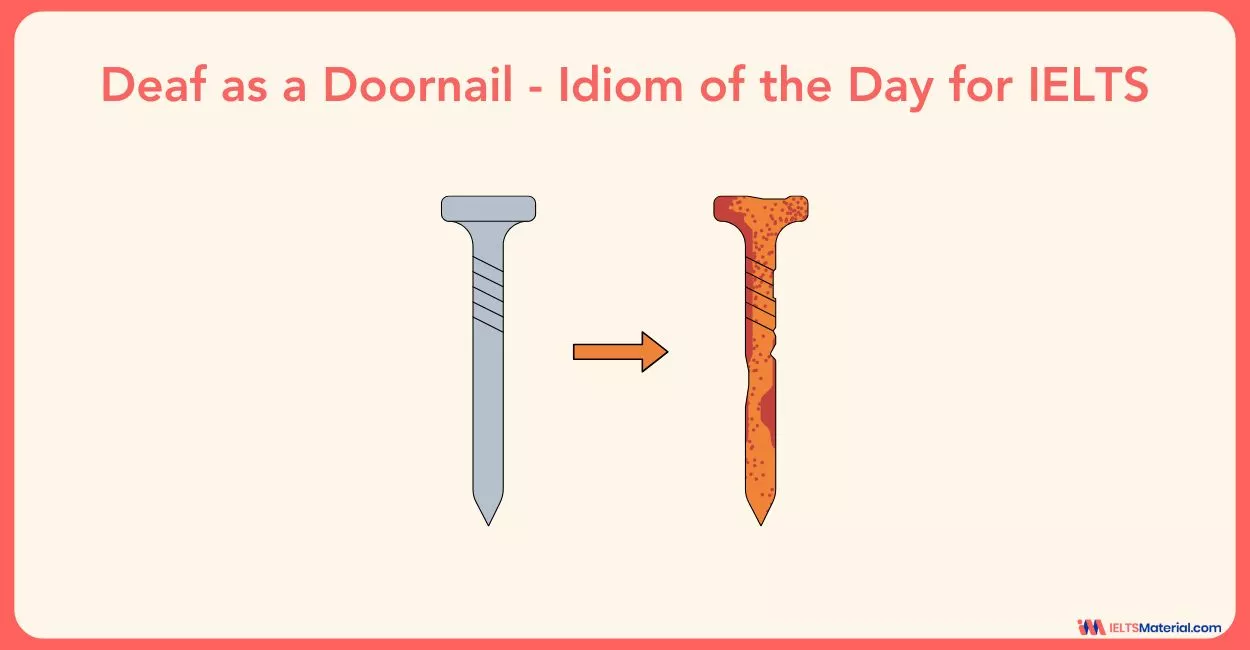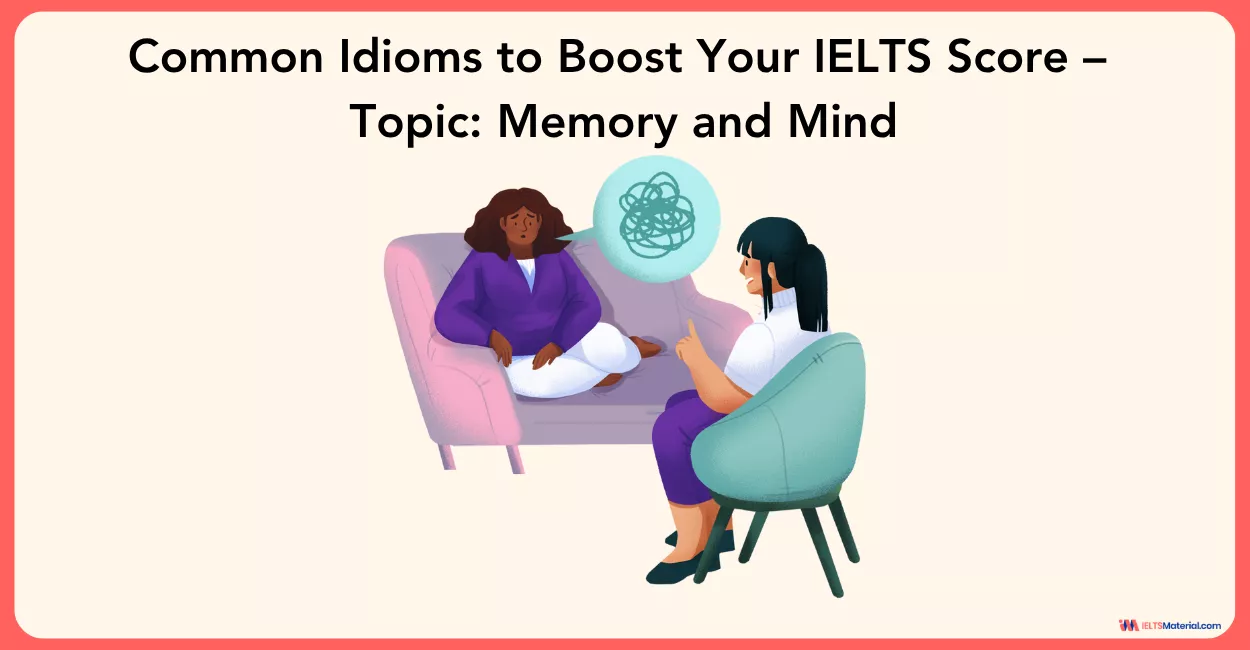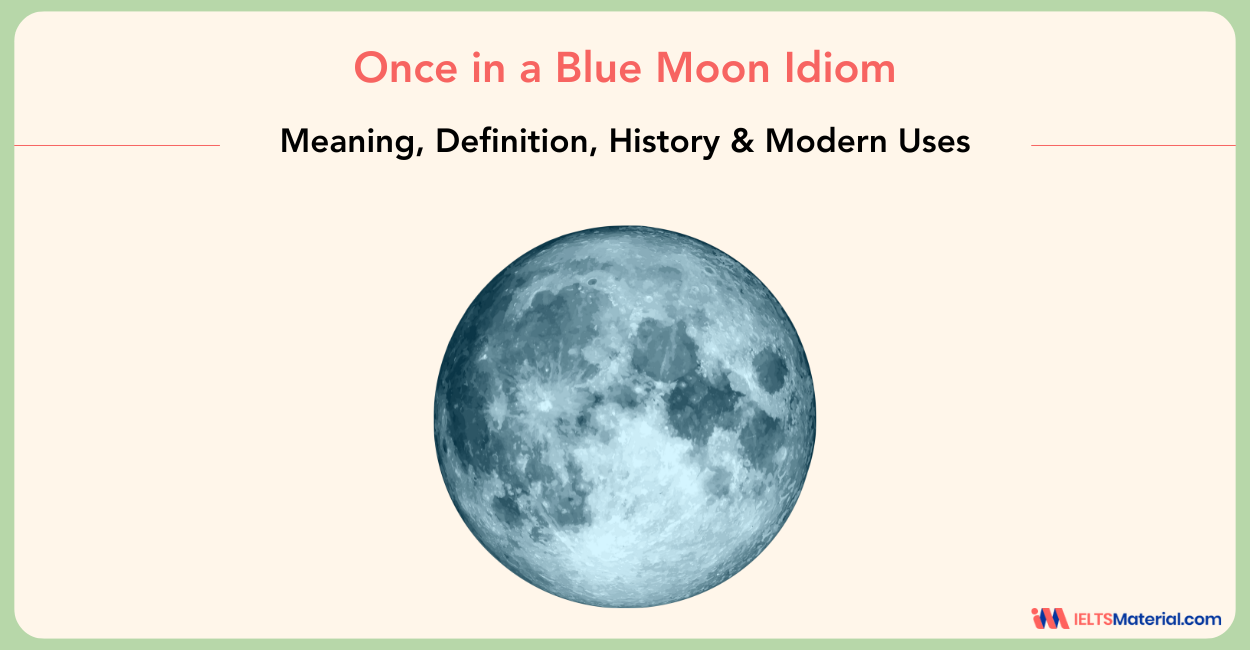Common Idioms to Boost Your IELTS Score – Topic: Memory and Mind
Enhance your IELTS band score with idioms about memory and mind. Explore common idioms, meanings, examples, and practice exercises to improve fluency and vocabulary in IELTS Speaking and Writing.
Table of Contents

Limited-Time Offer : Access a FREE 10-Day IELTS Study Plan!
Idioms connected to memory and mind are often used in everyday English to express thoughts, feelings, and reactions more naturally. In the IELTS Speaking test, using these idioms appropriately can make your responses sound fluent and engaging. This guide covers useful idioms related to remembering, thinking, and logical reasoning, along with examples and exercises for better understanding.
Idioms about Remembering and Forgetting
These idioms describe how people remember or forget things. They are especially useful in IELTS Speaking Part 2 when describing past experiences or memorable events.
1. Cross Your Mind
- If something crosses your mind, you suddenly think of it.
Example: It crossed my mind that she might be lying about her age.
2. Bear/Keep Something in Mind
- Used to remind or warn someone about something important they should remember.
Examples:
There are a few general rules to bear in mind when selecting plants.
Keep in mind that some places are more dangerous than others for women travelling alone.
3. Slip Someone’s Memory/Mind
- To forget something unintentionally.
Example: It completely slipped my mind that I had a meeting with my partner yesterday.
4. A Mind Like a Sieve
- If you have a mind like a sieve, you forget things easily.
Example: He’s lost his keys again – he’s got a mind like a sieve.
5. Trip/Walk Down Memory Lane
- To remember or talk about things that happened in the past.
Example: My grandmother spends a lot of time walking down memory lane these days.
6. Jog Someone’s Memory
- To help someone remember something they’ve forgotten.
Example: I had to jog my grandfather’s memory so he could recall his Facebook password.
7. On the Tip of Your Tongue
- When you almost remember something but can’t recall it fully.
Example: His name is on the tip of my tongue, but I can’t remember it right now.
Feeling stuck with IELTS Vocabulary? Register for our webinar and unlock your potential today!
Idioms about Thinking and Realization
These idioms refer to the process of thinking, realizing, or recalling ideas. They can be used effectively when expressing opinions or reasoning during IELTS Speaking Part 3.
1. Food for Thought
- If something gives you food for thought, it makes you think deeply about an issue.
Example: The seminar on climate change gave us all food for thought.
2. Rack Your Brain
- To think very hard or try to remember something.
Examples: I racked my brain but couldn’t come up with a solution. She racked her brains for the right words to use.
3. Off the Top of Your Head
- To say something without much thought or preparation.
Example: Off the top of my head, I’d say there are around ten students in that class.
4. Ring a Bell
- When something sounds familiar but you can’t recall where you’ve heard it before.
Example: That name rings a bell, but I can’t remember where I heard it.
5. Cross Your Mind
- To think of something briefly or unexpectedly.
Example: It never crossed my mind that she could be so talented.
Want to improve your grammar? Get the newly launched IELTS Grammar book today!
Idioms about Confusion or Illogical Thinking
These idioms describe situations where people lose focus, act illogically, or behave strangely. Using them appropriately can add variety to your IELTS answers.
1. Lose the Plot
- To become confused, disorganized, or unable to handle a situation.
Example: He’s been working so many hours that he’s losing the plot.
2. Out of Your Mind / Off Your Head
- Used to describe someone acting crazy, foolish, or extremely worried.
Examples: You spent $500 on a jacket? Are you out of your mind? You must be off your head to drive in such a storm.
3. A Gut Reaction
- An instinctive feeling or immediate response without logical thought.
Example: My gut reaction was to say no immediately.
4. Lose Your Train of Thought
- When you forget what you were saying because of a distraction or interruption.
Example: Sorry, I lost my train of thought—what was I saying again?
5. Miles Away
- If someone is miles away, they are lost in thought and not paying attention.
Example: You didn’t hear a word I said, did you? You were miles away.
Struggling with grammar for the IELTS? Sign up for our online class & master the words to succeed!
IELTS Tip
Idioms like “food for thought”, “cross my mind”, and “on the tip of my tongue” can make your IELTS Speaking answers sound more expressive. However, make sure you use them naturally and only when the context fits. Forced or incorrect usage can affect your fluency and coherence score.
Practice Exercises
These exercises will help you review and apply the idioms correctly.
Exercise A – Fill in the Blanks
Use the correct word: head, mind, brain, thought, brains.
- Do you have the memory of an elephant or a __________ like a sieve?
- You are mad. Totally off your __________.
- He was behaving as if he was out of his __________.
- The lecture gave us plenty of food for __________.
- Off the top of your __________, what do you know about Vitamin C?
- Rack your __________ and tell me everything you know.
Exercise B – Choose the Best Answer
- ‘Do you know anyone called Frascati?’ – ‘Well, the name ______.’
a) racks my brains b) rings a bell c) is miles away - ‘You don’t know anyone else who might be free?’ – ‘Not ______, no.’
a) crossing my mind b) on the tip of my tongue c) off the top of my head - I’m trying to remember his name; it’s ______.
a) racking my brains b) on the tip of my tongue c) crossed my mind
Visit IELTS eBooks store for top-rated books & elevate your IELTS preparation!
Answer Key
Exercise A – Fill in the Blanks
Use the correct word: head, mind, brain, thought, brains
- Do you have the memory of an elephant or a mind like a sieve?
- You are mad. Totally off your head.
- He was behaving as if he was out of his mind.
- The lecture gave us plenty of food for thought.
- Off the top of your head, what do you know about Vitamin C?
- Rack your brains and tell me everything you know.
Exercise B – Choose the Best Answer
- b) rings a bell
- c) off the top of my head
- b) on the tip of my tongue
To summarize, the idioms related to memory and mind can enhance your fluency and make your IELTS Speaking responses sound more natural. Practice using these idioms in context, and remember that accuracy and appropriateness are more important than quantity. With consistent use, these expressions will become part of your everyday English.
Also Check:
- Improve Your Vocabulary for IELTS – Key Word: Space
- Improve Your Vocabulary for IELTS – Key Word: Size
- Using Collocation to Boost Your IELTS Score - Key Word: decision
- Using Collocation to Boost Your IELTS Score - Key Word: a series of
- Grammar For IELTS : The Common Grammars And Sentence Structures In English (Part 1
- Grammar For IELTS : The Common Grammars And Sentence Structures In English (Part 2)
- Using Contrast in IELTS Speaking & Writing: Advanced Grammar in IELTS
- 100+ Advanced Vocabulary Word List for IELTS (PDF Available)
Explore IELTS Resources

Start Preparing for IELTS: Get Your 10-Day Study Plan Today!
Recent Articles

Kasturika Samanta

Prity Mallick

Nehasri Ravishenbagam





Post your Comments